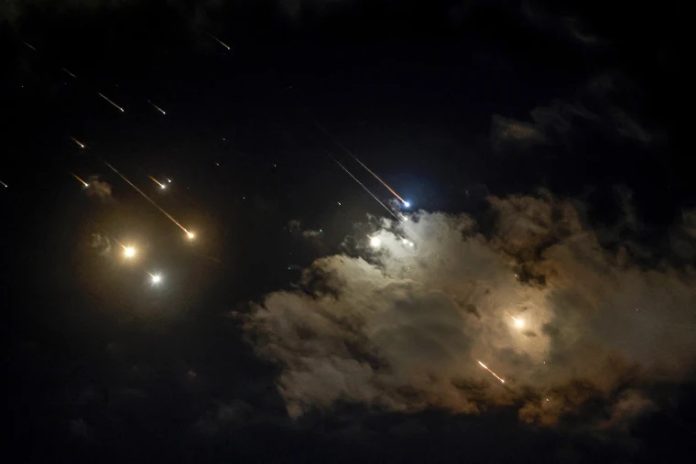On Tuesday night, approximately 180 ballistic missiles were launched toward Israel by Iran, leading to the activation of 1,800 rocket sirens across the country. This has sparked fear that this event could potentially trigger World War 3 (WW3).
According to Israeli media, a Palestinian worker from Gaza was killed by falling rocket fragments in Jericho, located in the West Bank.
Eli Bin, CEO of Magen David Adom, confirmed that a building in north Tel Aviv on George Wise Street was directly hit. Additionally, three people were injured from falls in Tel Aviv. A strike also targeted a home in Tel Sheva, and a Chabad school in Gedera suffered significant damage due to a direct hit, leaving a large crater, as reported by Maariv. The school’s head, overseeing 400 students, noted, “Just a few hours earlier, students were here learning about Rosh Hashanah. It’s a miracle no one was hurt.”
Missile strikes were also reported in Tel Aviv, Dimona, Nabatim, Hora, Hod Hasharon, Beersheba, and Rishon Lezion, with Israeli air defenses intercepting several missiles over Syria, according to Reuters.
Footage from KAN showed missile fragments falling near the Dead Sea. Ben Gurion Airport temporarily halted all takeoffs and landings, causing planes en route to Israel to turn back, while Jordan and Iraq closed their airspace. Airport operations resumed later in the evening.
National Security Minister Itamar Ben-Gvir announced the mobilization of 13,000 emergency standby squads to be deployed nationwide.
Iran’s Revolutionary Guards claimed responsibility for the missile barrage, stating it was in retaliation for the assassination of Hezbollah leader Hassan Nasrallah. They warned of further action should Israel retaliate. A U.S. official confirmed that the U.S. had indications of Iran’s plans for a ballistic missile attack and was providing support to Israel’s defensive efforts. The official stressed that a direct Iranian military attack on Israel would result in severe consequences for Iran.
Residents in affected areas were advised by the IDF to stay in protected spaces. IDF spokesperson Rear Admiral Daniel Hagari confirmed the military’s high state of readiness, noting both offensive and defensive measures were in place to respond to any attacks. Hagari emphasized cooperation with U.S. CENTCOM forces, adding, “We are prepared for any situation.”
Earlier Tuesday, the IDF took the rare step of preemptively instructing the entire Tel Aviv region to seek shelter, even before rocket sirens were triggered. The decision came as Israeli and U.S. intelligence confirmed imminent Iranian missile attacks.
Later, the IDF intercepted a long-range rocket launched by Hezbollah aimed at Tel Aviv. However, due to ongoing concerns about a larger Iranian offensive, the IDF urged Tel Aviv residents to remain close to their bomb shelters.
The U.S. Embassy has advised its staff to shelter in place, and Israel’s intelligence headquarters north of Tel Aviv was evacuated as a precaution. The U.S. has positioned an aircraft carrier in the region to help de-escalate tensions and manage any potential Iranian responses.
10 Life-Saving Essentials You Need to Survive a House Fire
This attack marks the second direct military confrontation between Israel and Iran, following recent Israeli strikes on Hezbollah targets in Lebanon. The IDF’s actions significantly weakened Hezbollah, including the assassination of Nasrallah, prompting Iran’s warning of reprisals. In April, Iran launched missiles at Israel, but those were intercepted by the coordinated efforts of Israel, the U.S., France, Jordan, and the United Kingdom. Tuesday’s attack is expected to surpass the scale of the April offensive, which involved 120 ballistic missiles, 170 drones, and dozens of cruise missiles.
Three Israeli officials stated that the latest attack would likely target military airbases and an intelligence headquarters north of Tel Aviv.

